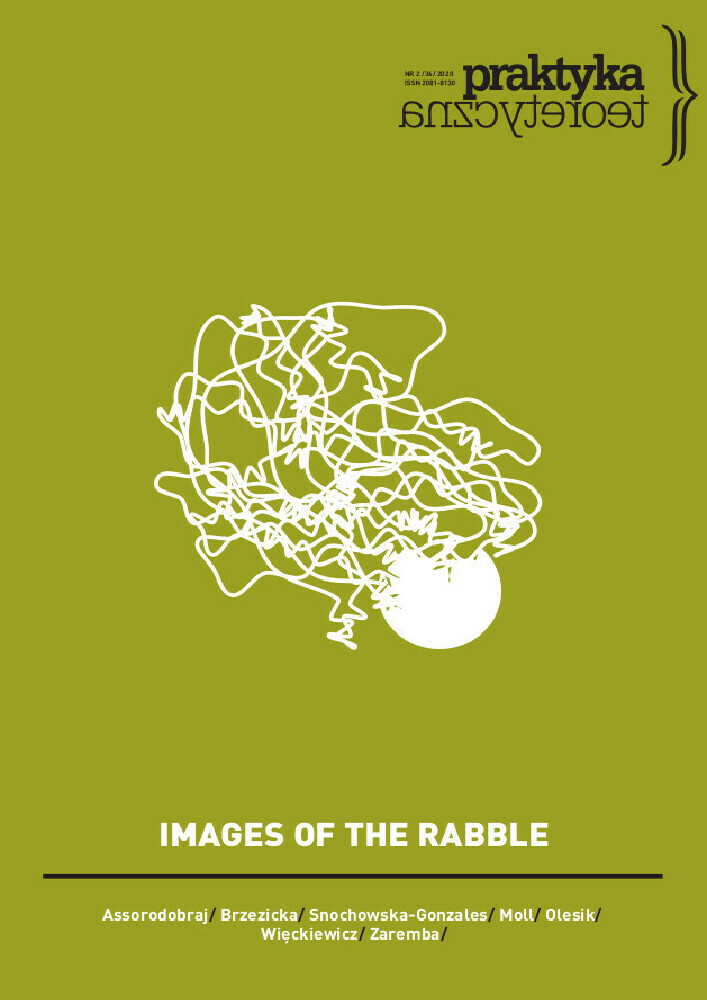Abstract
When analyzing the neoliberal model of the market in terms of the transcendental conditions it creates, researchers concentrate on two distinct categories - competition and debt. Together, they constitute a form of reason specific to the economic development which occurred in our recent history. The aim of this text is to show how the financial crisis of 2007-2008 affected these two iterations of the neoliberal economic paradigm, with the bailout procedure simultaneously breaching the rules of competition and debt and then slyly re-purposing them in order to justify the situation. This re-purposing is the eponymous logical bailout which depended on a brand new transcendental form which the market has taken on. This form is introduced in a nutshell by the formula “too big to fail”. The essay shows that this slogan helped introduce an understanding of the market in terms of an environment – an intricate and inherently fragile network whose preservation is necessary for the survival of the species inhabiting it. This transcendental shift will be discussed as a survival mechanism which allowed the neoliberal paradigm to avoid demise despite its complete fiasco.
References
Arrighi, Giovanni and Silver, Beverly J, et al. 1999. Chaos and Governance in the Modern World System. Minneapolis and London: University of Minnesota Press.
Blyth, Mark. 2013. Austerity: The History of a Dangerous Idea. Oxford: Oxford University Press.
Brown, Wendy. 2015. Undoing the Demos: Neoliberalism’s Stealth Revolution. New York: Zone Books.
Fisher, Mark. 2009. Capitalist Realism: Is There no Alternative?. Winchester: Zero Books.
Harvey, David. 2010. The Enigma of Capital and the Crises of Capitalism. Oxford: Oxford University Press.
Lazzarato, Maurizio. 2012. The Making of the Indebted Man: An Essay on the Neoliberal Condition. Translated by Joshua David Jordan. Los Angeles: Semiotext(e).
Marazzi, Christian. 2011. The Violence of the Financial Capitalism. Translated by Kristina Lebedeva and Jason Francis McGimsey. Los Angeles: Semiotext(e).
Marx, Karl. 1991. Capital: A Critique of Political Economy Volume 3. Translated by David Fernbach. London: Penguin Books.
Milward, Bob, Mohan, Giles, Zack-Williams, Alfred B. and Brown, Ed. 2000. Structural Adjustment: Theory, Practice and Impacts. London-New York: Routledge.
Mirowski, Philip. 2013. Never Let a Serious Crisis go to Waste: How Neoliberalism Survived the Financial Meltdown. London-New York: Verso.
Moore, Jason W. 2015.Capitalism in the Web of Life: Ecology and the Accumulation of Capital. London and New York: Verso.
Nietzsche, Friedrich. 2002.Beyond Good and Evil: Prelude to a Philosophy of the Future. Translated by Judith Norman. Cambridge-New York: Cambridge University Press.
Nietzsche, Friedrich. 1989. On the Genealogy of Morals. Ecce Homo. Translated by Walter Kaufmann and R. J. Hollingdale. New York: Vintage Books.
Peck, Jamie. 2010. Constructions of Neoliberal Reason. Oxford: Oxford University Press.
Quiggin, John. 2010. Zombie Economics: How Dead Ideas Still Walk Among Us. Princeton and Oxford: Princeton University Press.
Shiller, Robert J. 2000. Irrational Exuberance. Princeton: Princeton University Press.
Tooze, Adam. 2018. Crashed: How a Decade of Financial Crises Changed the World. New York: Viking.
License
“Theoretical Practice” seeks to put into practice the idea of open access to knowledge and broadening the domain of the commons. It serves the development of science, thinking and critical reflection. The journal is published in open-access mode under the CC-BY-NC-SA 4.0 license (detail available here: http://creativecommons.org/licenses/by-nc-sa/4.0/). Articles published in the journal may be freely distributed, stored, printed and utilized for academic and teaching purposes without restrictions.
They should not be, however, used for any commercial purposes or be reconstructed into derivative creations. Access to the journal may not be limited or offered for a fee by any third party.
Prospective authors are obliged to fill in, sign and send back the publishing contract compliant with the CC licencing. [PL.pdf, PL.doc, EN.pdf,EN.doc].
According to this contract, authors grant the journal a non-exclusive right to publish their work under the creative commons license (CC-BY-NC-SA 4.0) without any financial obligation on both sides of the contract.
Before submission authors should make sure that derivative materials they use are not protected by copyright preventing their non-commercial publication. Authors are responsible for any respective copyright violations.
